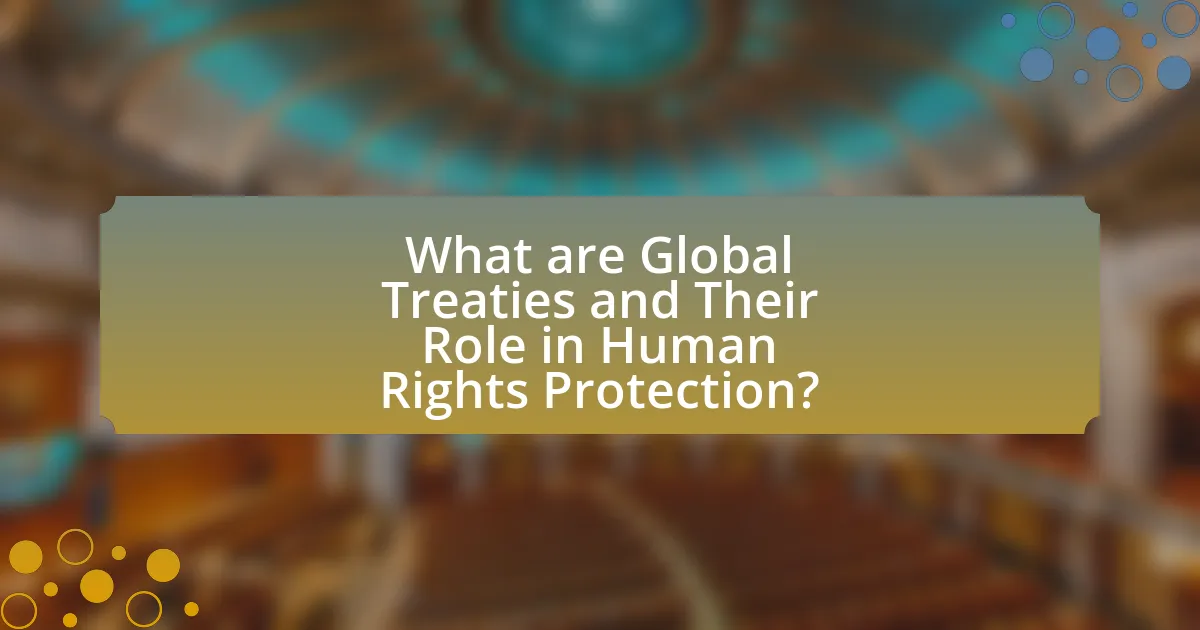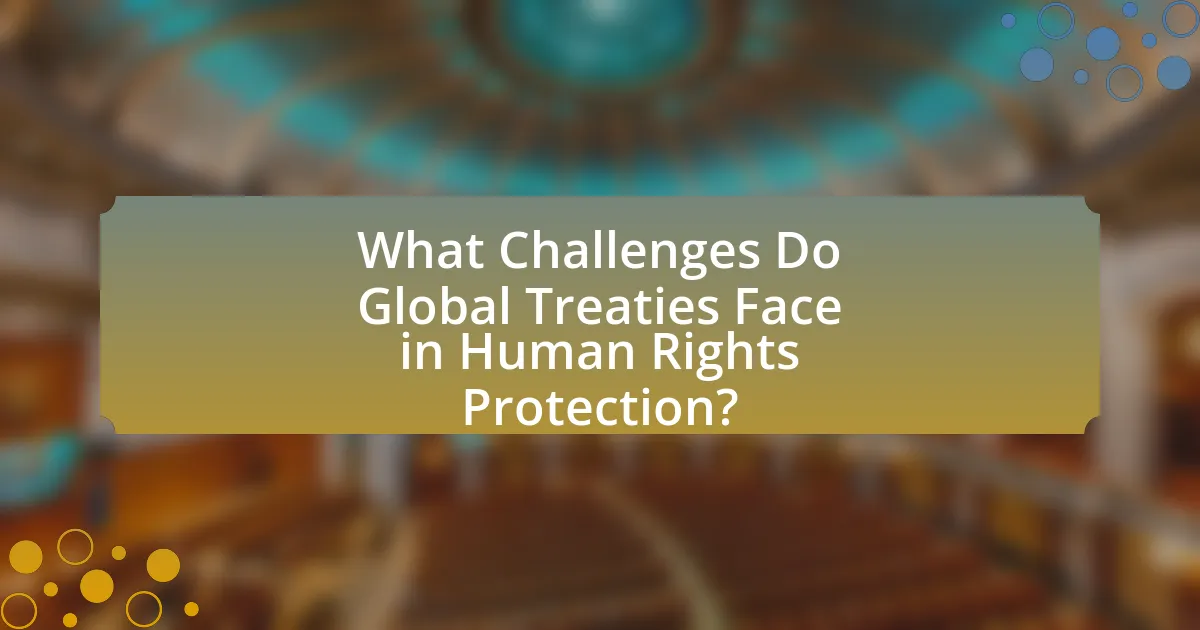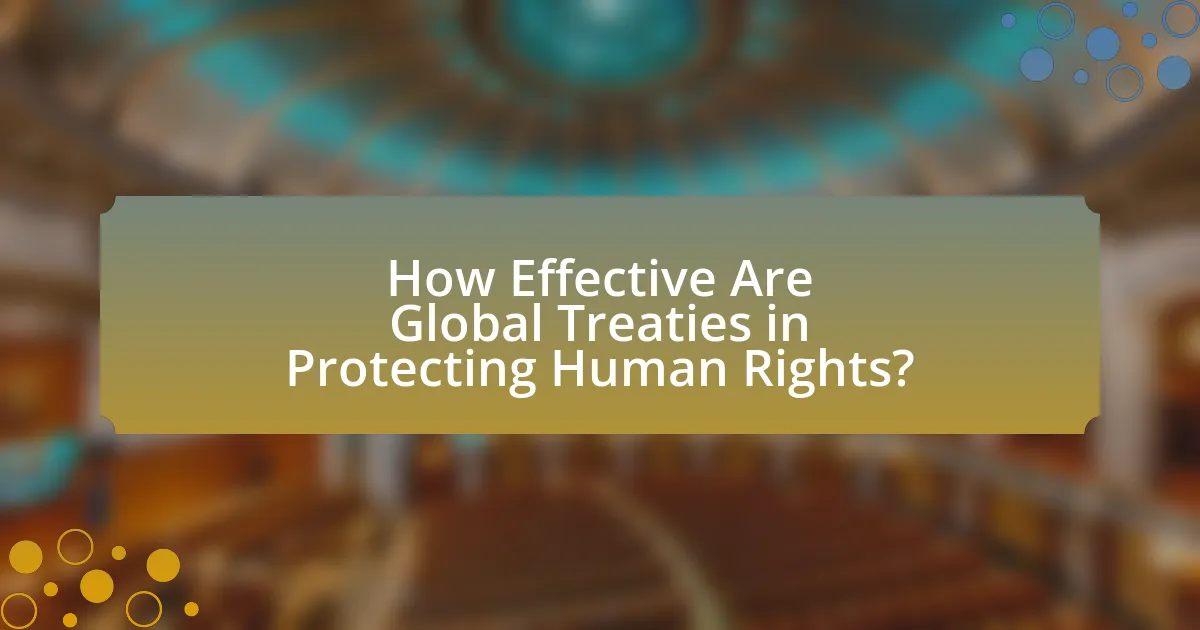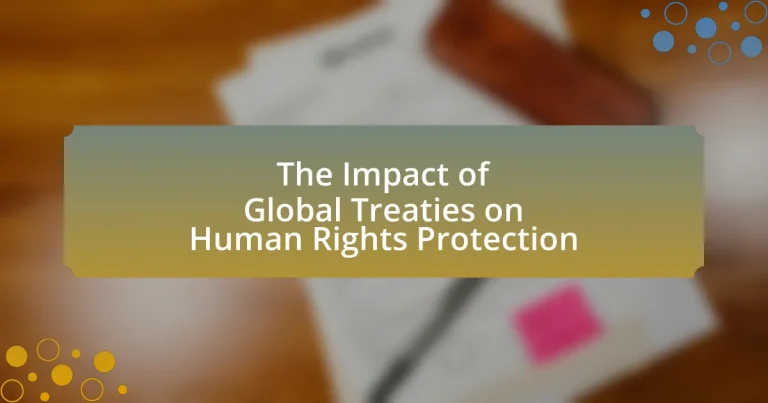Global treaties are formal agreements between countries that establish international legal standards for human rights protection. This article examines the role of key treaties, such as the Universal Declaration of Human Rights and the International Covenant on Civil and Political Rights, in promoting accountability and compliance among nations. It discusses the influence of these treaties on global human rights standards, the challenges they face in enforcement and state sovereignty, and the impact of political interests on treaty adherence. Additionally, the article highlights the effectiveness of treaties in improving specific human rights issues and explores best practices for enhancing their impact, including the role of civil society in monitoring implementation.

What are Global Treaties and Their Role in Human Rights Protection?
Global treaties are formal agreements between countries that establish international legal standards and obligations, particularly in the realm of human rights protection. These treaties, such as the Universal Declaration of Human Rights and the International Covenant on Civil and Political Rights, serve to promote and safeguard fundamental human rights by obligating signatory states to uphold specific standards and practices. For instance, the International Covenant on Economic, Social and Cultural Rights mandates that countries ensure the right to work, education, and an adequate standard of living. By ratifying these treaties, nations commit to monitoring and reporting on their human rights practices, thereby fostering accountability and encouraging compliance with international norms.
How do global treaties influence human rights standards worldwide?
Global treaties significantly influence human rights standards worldwide by establishing legally binding commitments for countries to uphold fundamental rights. These treaties, such as the Universal Declaration of Human Rights and the International Covenant on Civil and Political Rights, create a framework that obligates signatory nations to implement and respect human rights norms. For instance, the ratification of the Convention on the Elimination of All Forms of Discrimination Against Women has led to legislative reforms in many countries, promoting gender equality and protecting women’s rights. Furthermore, monitoring bodies associated with these treaties, like the Human Rights Committee, assess compliance and provide recommendations, thereby holding nations accountable and encouraging improvements in human rights practices globally.
What are the key global treaties related to human rights?
The key global treaties related to human rights include the Universal Declaration of Human Rights (UDHR), the International Covenant on Civil and Political Rights (ICCPR), and the International Covenant on Economic, Social and Cultural Rights (ICESCR). The UDHR, adopted by the United Nations General Assembly in 1948, sets out fundamental human rights to be universally protected. The ICCPR, adopted in 1966, commits its parties to respect the civil and political rights of individuals, including the right to life, freedom of speech, and religion. The ICESCR, also adopted in 1966, focuses on the economic, social, and cultural rights of individuals, such as the right to work, education, and an adequate standard of living. These treaties collectively form the foundation of international human rights law and are instrumental in promoting and protecting human rights globally.
How do these treaties establish legal obligations for countries?
Treaties establish legal obligations for countries by creating binding agreements that require signatory states to adhere to specific terms and conditions. These legal frameworks are often ratified by national legislatures, which incorporate the treaty obligations into domestic law, thereby ensuring compliance. For instance, the International Covenant on Civil and Political Rights mandates that countries protect individual rights, and failure to do so can lead to international scrutiny and potential sanctions. This binding nature is reinforced by mechanisms such as monitoring bodies and dispute resolution processes, which hold countries accountable for their commitments.
Why are global treaties essential for human rights advocacy?
Global treaties are essential for human rights advocacy because they establish internationally recognized standards that obligate countries to protect and promote human rights. These treaties, such as the Universal Declaration of Human Rights and the International Covenant on Civil and Political Rights, create a framework for accountability, enabling individuals and organizations to hold governments responsible for violations. Furthermore, they facilitate cooperation among nations, encouraging the sharing of best practices and resources to improve human rights conditions globally. The existence of these treaties has led to significant advancements in human rights protections, evidenced by the reduction of practices like torture and discrimination in many countries since their adoption.
What role do international organizations play in enforcing these treaties?
International organizations play a crucial role in enforcing treaties related to human rights protection by monitoring compliance, facilitating dialogue among member states, and providing mechanisms for accountability. For instance, organizations like the United Nations and the International Criminal Court establish frameworks that require states to report on their adherence to human rights treaties, thereby promoting transparency. Additionally, these organizations can impose sanctions or take legal action against violators, as seen in cases where the UN Security Council has acted in response to human rights abuses. This enforcement mechanism is vital for ensuring that states uphold their treaty obligations and protect human rights effectively.
How do treaties empower local human rights organizations?
Treaties empower local human rights organizations by providing them with a legal framework to advocate for rights and hold governments accountable. These international agreements establish standards that local organizations can reference when addressing human rights violations, thereby enhancing their legitimacy and influence. For example, the Convention on the Elimination of All Forms of Discrimination Against Women (CEDAW) allows local groups to challenge discriminatory practices in their countries by citing treaty obligations. Additionally, treaties often facilitate access to international bodies, enabling local organizations to report abuses and seek redress, which can lead to increased pressure on governments to comply with human rights standards.

What Challenges Do Global Treaties Face in Human Rights Protection?
Global treaties face significant challenges in human rights protection, primarily due to issues of enforcement, state sovereignty, and varying national interpretations of human rights standards. Enforcement is problematic because many treaties lack mechanisms to compel compliance, leading to selective adherence by states. For instance, the United Nations Human Rights Council can investigate violations but lacks the authority to enforce its findings. State sovereignty often results in resistance to external scrutiny, as nations prioritize their autonomy over international obligations. Additionally, differing cultural, political, and legal frameworks across countries lead to inconsistent interpretations of human rights, complicating the universal application of treaty provisions. These challenges hinder the effectiveness of global treaties in promoting and protecting human rights universally.
What are the common obstacles to the implementation of global treaties?
Common obstacles to the implementation of global treaties include lack of political will, insufficient resources, and varying national interests. Political will is often hindered by domestic priorities that conflict with treaty obligations, as seen in cases where governments prioritize economic growth over human rights commitments. Insufficient resources can impede effective implementation, particularly in developing countries where financial constraints limit the ability to enforce treaty provisions. Additionally, varying national interests can lead to selective adherence to treaty obligations, as countries may interpret commitments differently based on their geopolitical or economic contexts. These factors collectively undermine the effectiveness of global treaties in promoting human rights protection.
How do political interests affect treaty compliance?
Political interests significantly affect treaty compliance by influencing a state’s willingness to adhere to international agreements. When a government prioritizes its political agenda, it may selectively comply with treaty obligations that align with its interests while disregarding those that do not. For instance, countries may choose to ignore human rights treaties if they perceive that compliance could undermine their political stability or economic interests. Historical examples include the non-compliance of various nations with the International Covenant on Civil and Political Rights, where political regimes often prioritize control over human rights commitments. This selective adherence can lead to weakened international norms and reduced effectiveness of treaties aimed at protecting human rights.
What are the limitations of enforcement mechanisms in global treaties?
Enforcement mechanisms in global treaties face significant limitations, primarily due to the lack of binding authority and the reliance on state consent for compliance. Many treaties do not have robust enforcement provisions, which means that states can choose not to adhere to their obligations without facing substantial consequences. For instance, the United Nations Convention Against Torture lacks an enforcement body with the power to impose penalties, leading to inconsistent application and accountability. Additionally, political considerations often hinder enforcement, as powerful states may evade repercussions due to their influence in international relations. This results in a gap between treaty commitments and actual human rights protections, undermining the effectiveness of global treaties in safeguarding human rights.
Why do some countries resist ratifying human rights treaties?
Some countries resist ratifying human rights treaties due to concerns over national sovereignty and the potential for external interference in domestic affairs. Governments may fear that compliance with international standards could limit their ability to enact laws that align with cultural, political, or economic priorities. For instance, nations with authoritarian regimes often prioritize regime stability over human rights commitments, viewing treaties as threats to their control. Additionally, some countries may lack the institutional capacity to implement treaty obligations effectively, leading to reluctance in ratification. Historical examples include nations that have faced international scrutiny for human rights violations, which may lead them to avoid binding agreements that could expose them to further criticism or sanctions.
What cultural or legal factors contribute to this resistance?
Cultural and legal factors contributing to resistance against global treaties on human rights protection include deeply rooted cultural norms and national sovereignty concerns. Cultural norms often prioritize local traditions and values over international standards, leading to reluctance in adopting foreign human rights frameworks. For instance, in some societies, practices such as gender roles and family structures are influenced by cultural beliefs that may conflict with global human rights principles. Additionally, legal frameworks in various countries emphasize national sovereignty, which can result in resistance to external pressures for compliance with international treaties. Countries may argue that adherence to global human rights standards undermines their legal systems and autonomy, as seen in cases where governments prioritize domestic laws over international obligations.
How does national sovereignty impact treaty acceptance?
National sovereignty significantly impacts treaty acceptance by prioritizing a state’s autonomy over international obligations. Countries often resist treaties that they perceive as infringing on their sovereignty, fearing loss of control over domestic affairs. For instance, the United States has historically been cautious in ratifying treaties that could limit its legislative power, such as the Convention on the Rights of the Child, which remains unratified due to concerns about state sovereignty and parental rights. This reluctance illustrates how national sovereignty can hinder the implementation of global treaties aimed at enhancing human rights protection.

How Effective Are Global Treaties in Protecting Human Rights?
Global treaties are moderately effective in protecting human rights, as they establish international standards and frameworks for accountability. For instance, the Universal Declaration of Human Rights, adopted in 1948, set foundational principles that many countries have incorporated into their national laws. However, enforcement remains a significant challenge, as compliance often depends on the political will of individual states. According to the United Nations, while over 170 countries have ratified the International Covenant on Civil and Political Rights, violations persist, indicating that treaties alone do not guarantee protection. The effectiveness of these treaties is further complicated by the lack of binding enforcement mechanisms, which limits their ability to compel states to adhere to human rights obligations.
What evidence exists to support the effectiveness of global treaties?
Global treaties have demonstrated effectiveness in promoting human rights through measurable improvements in legal frameworks and compliance rates among signatory nations. For instance, the Convention on the Elimination of All Forms of Discrimination Against Women (CEDAW) has led to significant legislative changes in over 180 countries, resulting in increased gender equality and protection against discrimination. Additionally, the Universal Declaration of Human Rights has influenced national constitutions and laws, with many countries adopting provisions that align with its principles, thereby enhancing human rights protections. Research by the Human Rights Council indicates that countries adhering to international treaties show a 20% higher compliance rate with human rights standards compared to non-signatories, underscoring the treaties’ role in fostering accountability and legal reform.
How have global treaties led to improvements in specific human rights issues?
Global treaties have significantly improved specific human rights issues by establishing binding commitments for countries to uphold fundamental rights. For instance, the Convention on the Elimination of All Forms of Discrimination Against Women (CEDAW), adopted in 1979, has led to legislative reforms in numerous countries, enhancing women’s rights in areas such as education, employment, and political participation. According to a report by the United Nations, countries that ratified CEDAW have seen increased representation of women in government and improved access to healthcare and education. Similarly, the Convention on the Rights of the Child (CRC), adopted in 1989, has prompted nations to implement laws protecting children from exploitation and abuse, resulting in a decline in child labor rates globally. These treaties create accountability mechanisms, encouraging states to report on their progress and adhere to international standards, thereby fostering a culture of respect for human rights.
What case studies illustrate the success of treaty implementation?
Case studies illustrating the success of treaty implementation include the Convention on the Rights of the Child (CRC) and the Convention on the Elimination of All Forms of Discrimination Against Women (CEDAW). The CRC, adopted in 1989, has led to significant improvements in child welfare, with countries like Sweden and Portugal reporting reductions in child poverty and increased access to education and healthcare. CEDAW, established in 1979, has resulted in enhanced legal frameworks for women’s rights in nations such as Rwanda, where women now hold over 60% of parliamentary seats, demonstrating a commitment to gender equality. These examples highlight how effective treaty implementation can lead to measurable advancements in human rights protection.
What are the criticisms of global treaties regarding human rights protection?
Global treaties regarding human rights protection face several criticisms, primarily centered on their enforcement mechanisms, cultural relativism, and state sovereignty. Critics argue that many treaties lack effective enforcement, leading to non-compliance by states without consequences, as seen in cases like the Convention Against Torture, where violations persist despite ratification. Additionally, the principle of cultural relativism challenges the universality of human rights, with some nations asserting that global standards do not align with local customs and values, which can undermine the treaties’ effectiveness. Furthermore, concerns about state sovereignty arise when treaties are perceived as infringing on a nation’s right to govern itself, leading to resistance from countries that prioritize national interests over international obligations. These criticisms highlight significant challenges in the implementation and acceptance of global human rights treaties.
How do critics argue that treaties may fall short in practice?
Critics argue that treaties may fall short in practice due to issues such as lack of enforcement mechanisms and the voluntary nature of compliance. For instance, many international treaties rely on states to self-report their adherence, which can lead to discrepancies between actual practices and reported compliance. Additionally, critics highlight that without binding enforcement measures, states may ignore treaty obligations without facing significant consequences, as seen in cases like the Convention on the Rights of the Child, where violations persist despite ratification. This lack of accountability undermines the effectiveness of treaties in promoting and protecting human rights globally.
What alternative approaches exist to enhance human rights protection?
Alternative approaches to enhance human rights protection include the establishment of regional human rights mechanisms, the promotion of civil society engagement, and the implementation of corporate social responsibility frameworks. Regional mechanisms, such as the European Court of Human Rights, provide additional legal avenues for individuals to seek justice when national systems fail. Civil society organizations play a crucial role in advocating for human rights, raising awareness, and holding governments accountable, as evidenced by their involvement in the Universal Periodic Review process of the United Nations. Furthermore, corporate social responsibility initiatives encourage businesses to adopt ethical practices that respect human rights, contributing to broader societal protections. These approaches collectively strengthen the framework for human rights protection beyond traditional state-centric models.
What Best Practices Can Enhance the Impact of Global Treaties on Human Rights?
Best practices that can enhance the impact of global treaties on human rights include ensuring robust implementation mechanisms, fostering inclusive participation, and promoting accountability measures. Effective implementation mechanisms, such as regular monitoring and reporting systems, enable states to adhere to treaty obligations, as evidenced by the success of the Convention on the Rights of the Child, which has led to improved child welfare in numerous countries. Inclusive participation from civil society and marginalized groups ensures that diverse perspectives are considered, enhancing the legitimacy and effectiveness of treaties, as seen in the engagement strategies of the Universal Periodic Review process. Furthermore, accountability measures, including independent oversight bodies and judicial remedies, are crucial for enforcing compliance and addressing violations, as demonstrated by the International Criminal Court’s role in prosecuting human rights abuses. These practices collectively strengthen the framework of global treaties, leading to more significant advancements in human rights protection.
How can countries improve their compliance with human rights treaties?
Countries can improve their compliance with human rights treaties by implementing robust legal frameworks and ensuring effective enforcement mechanisms. Establishing clear laws that align with international human rights standards allows for better accountability and protection of rights. For instance, the Universal Declaration of Human Rights and various treaties, such as the International Covenant on Civil and Political Rights, provide a foundation for these legal frameworks. Additionally, countries can enhance compliance by fostering a culture of human rights through education and training for public officials, which has been shown to increase awareness and adherence to human rights obligations. Furthermore, engaging with civil society organizations can facilitate monitoring and reporting on human rights practices, thereby promoting transparency and accountability.
What role does civil society play in monitoring treaty implementation?
Civil society plays a crucial role in monitoring treaty implementation by acting as a watchdog that holds governments accountable for their commitments. Organizations within civil society, such as non-governmental organizations (NGOs) and advocacy groups, engage in activities like gathering data, conducting research, and reporting on compliance with treaty obligations. For instance, the Universal Periodic Review process of the United Nations allows civil society to submit reports highlighting human rights violations and the effectiveness of treaty implementation in various countries. This involvement not only enhances transparency but also provides a platform for marginalized voices, ensuring that the impact of treaties on human rights protection is effectively assessed and addressed.


